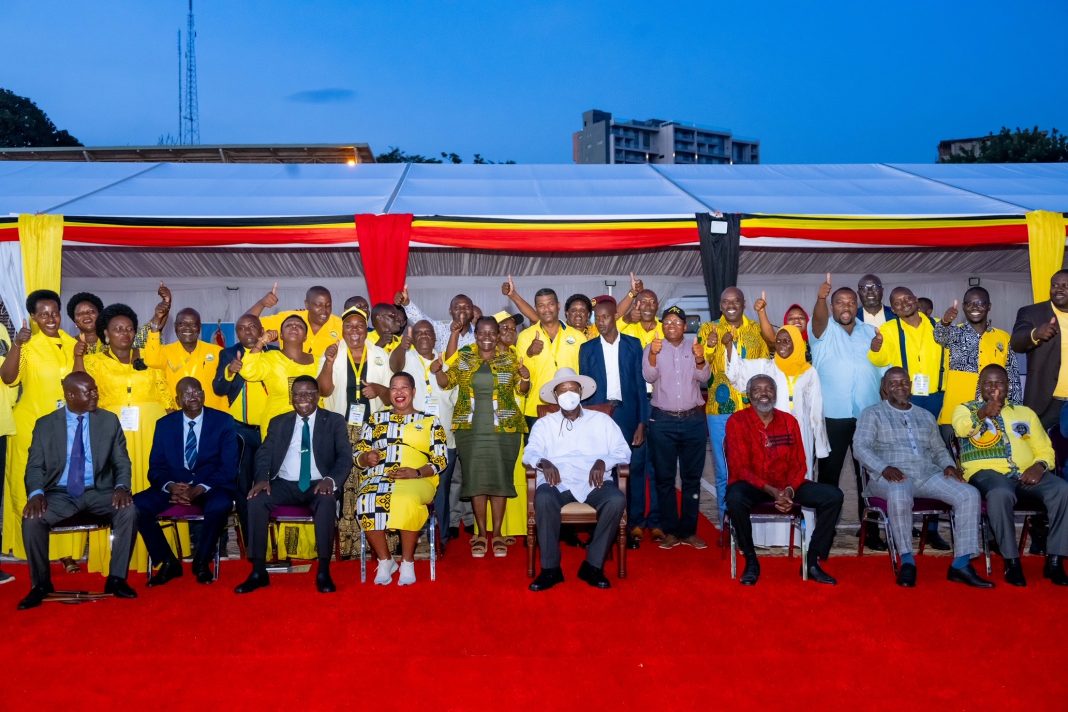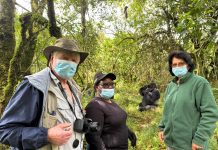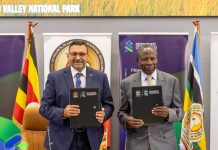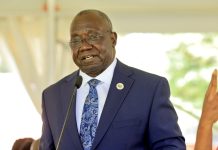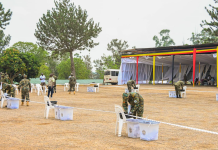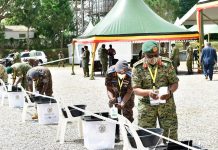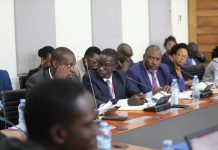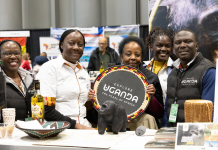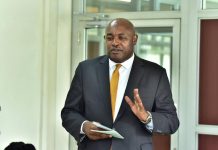President Yoweri Kaguta Museveni has once again called on Uganda’s political actors to embrace peaceful dialogue and reject violence as the country prepares for the 2026 general elections.
Addressing leaders of six political parties during the Inter-Party Organisation for Dialogue (IPOD) Summit at Kololo Ceremonial Grounds on September 18, 2025, President Museveni said Uganda’s progress depends on leaders diagnosing societal challenges correctly and applying peaceful solutions rather than resorting to subversion, violence, and divisive politics.
The summit, convened under the theme “Together for a Peaceful and Sustainable Uganda,” brought together Presidents and Secretary Generals of the National Resistance Movement (NRM), Democratic Party (DP), Uganda People’s Congress (UPC), Forum for Democratic Change (FDC), Justice Forum (JEEMA), and the People’s Progressive Party (PPP).
In his keynote address, President Museveni, speaking in his dual capacity as NRM National Chairman and IPOD Summit Chair, urged opposition leaders to adopt peaceful methods of engagement, emphasizing that mistakes in governance can be corrected over time if the country remains stable.
“As we have seen in the last 40 years, the NRM has revived Uganda’s economy. Although we still face challenges, we are much stronger than ever before. Even if one has a wrong understanding, as long as they are not violent, the country will remain stable, and in the future, mistakes can be corrected,” H.E. Museveni said.
He argued that Africa’s biggest tragedy stems from both wrong diagnoses of societal problems and the use of violent methods.
“That is how chaos arises in many African countries. Even when you make mistakes, if there is peace, there is room for correction. But when you combine wrong ideas with violence, you get a total breakdown,” he added.
Reflecting on his long political career, President Museveni reminded party leaders that he had been involved in politics for 65 years, beginning as a Democratic Party youth leader in 1960 before joining UPC briefly in 1970.
“Politics must be like medicine. A political leader should be like a doctor—able to correctly diagnose the problems of society. If the diagnosis and prescription are wrong, the patient dies. If leaders misdiagnose societal issues, their countries collapse,” he explained.
He reiterated the NRM’s four principles—patriotism, Pan-Africanism, socio-economic transformation, and democracy—urging that these values remain key to securing Uganda’s future.
President Museveni also weighed in on the recent teachers’ strike, which UPC President Jimmy Akena had raised during discussions. He stressed the importance of prioritizing limited national resources, citing the case of Soroti Flying School, where pilots and engineers were prioritized over other staff to prevent the school’s collapse.
“In Soroti flying school, we needed most pilots and engineers of the aircraft, but they didn’t have the money to pay all of them well. They were not prioritizing, saying, we must all get equal, either we all get or nobody gets, that logic is not correct. We, freedom fighters, always prioritize. I advised them, and they agreed to pay the pilots well,” President Museveni explained.
At the same ceremony, President Museveni handed over the IPOD Chairmanship to the Democratic Party’s Chairman, Hon. Norbert Mao.
“Thank you for having trusted us, NRM, for the last five years with the leadership I now peacefully hand over,” H.E. Museveni said.
NRM Secretary General, Rt. Hon. Richard Todwong, also Chair of the IPOD Council of Secretaries General, applauded President Museveni for sustaining IPOD after international donors withdrew funding.
“We were orphaned as IPOD when donors left, but as a father, you picked us up and have nurtured IPOD. You have shown that homegrown solutions can address African challenges,” Rt. Hon. Todwong said.
He urged all political parties to continue promoting unity, dialogue, and democratic values, adding, “Together, we can build a stronger, more inclusive, and accountable political system that serves all Ugandans.”
Hon. Mao takes over IPOD leadership:
The summit also marked a leadership transition, with Democratic Party President General, Hon. Mao, assuming the chairmanship of IPOD from President Museveni.
In his remarks, Hon. Mao emphasized consensus-building as the foundation of national unity, further committing to a peaceful election in 2026.
“So today, I, on behalf of the DP, take the leadership of IPOD. I want to announce that we shall leave the door of IPOD open. Our agenda will be to ensure that we have a peaceful election, a free and fair process, and that we shall continue to talk honestly about the problems we face, that we shall attack the problems that face Uganda, rather than attacking each other for God and my country,” he said.
“We cannot have a country where there is no consensus about anything. We may disagree on some things, but we must find common ground. IPOD is about finding common ground, because the unity of Uganda is paramount. I’m delighted that the IPOD summit members are the 20% who want to offer at least 80% of the solution,” Hon. Mao added, commending President Museveni for ordering the release of nearly 70 political detainees earlier this year following discussions between DP and NRM.
“Sometimes small gestures like this are not appreciated, but they are significant steps towards reconciliation,” he said.
On the other hand, UPC President Jimmy Akena reaffirmed his party’s commitment to dialogue, describing it as essential for building unity during the upcoming election season.
“As Ugandans, we may not agree on every policy, but we must focus on the greater good. UPC will always choose dialogue to overcome difficulties,” Hon. Akena said.
“Even in a tough election season, our goal is to emerge stronger and more united.”
Forum for Democratic Change President Patrick Oboi Amuriat underscored FDC’s long-standing support for IPOD but warned that dialogue must be meaningful and lead to tangible results.
“Our country is fractured along tribal, religious, and political lines. We must emphasize reconciliation,” Mr. Amuriat said. He called on President Museveni to exercise clemency and pardon political prisoners, including those awaiting delayed justice.
“Progress requires leaving the past behind. Clemency will demonstrate goodwill and help this country move forward,” he urged.
JEEMA President Asuman Basalirwa echoed similar sentiments, stressing that Uganda’s problems can only be addressed through dialogue and consensus.
Mr. Saddam Gayira, President of the People’s Progressive Party (PPP), highlighted the success of non-confrontational politics.
“In 30 years of politics, I have never been summoned by the police. Even in the last election, none of our members were arrested. Why? Because we preach peaceful engagement,” Mr. Gayira said.
He urged fellow leaders to treat each other with respect, regardless of party differences.
Dr. Lawrence Sserwambala, IPOD’s Executive Director, acknowledged the platform’s milestones but warned that challenges such as electoral violence, weak enforcement of the code of conduct, and youth vulnerability remain pressing.
“Uganda’s youthful population, particularly in urban ghettos, is vulnerable to manipulation into violence. IPOD must nurture them as champions of peace,” he said.
Dr. Sserwambala urged that the 2026 elections provide a critical opportunity to strengthen consensus, fairness, and inclusivity.
“Uganda is watching us. History will judge us by the choices we make. Let us choose peace, let us dialogue, let us put Uganda first,” he noted.
The summit was also attended by top leaders, including Speaker of Parliament, Rt. Hon. Anita Among, Electoral Commission Chairperson, Justice Simon Byabakama, NRM’s Central Executive Committee members, and delegations from all IPOD member parties. Their presence symbolized the broad-based support for dialogue as a central tool for conflict resolution and democratic progress.


